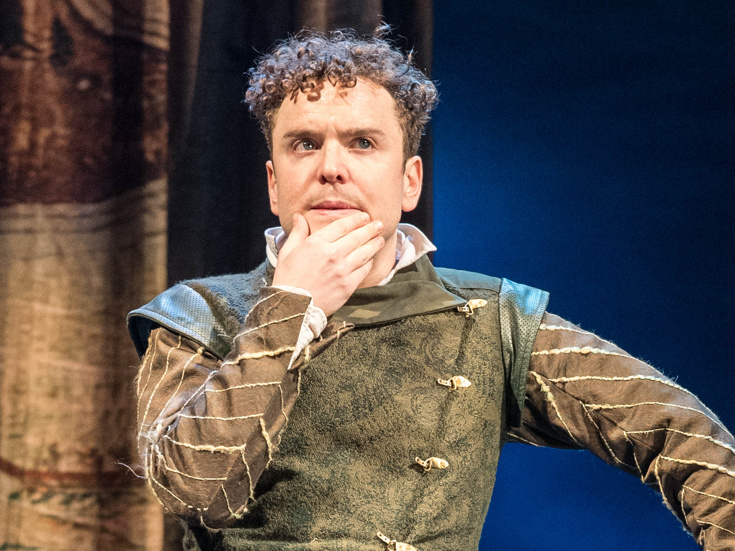Rosencrantz & Guildenstern Are Dead's Joshua McGuire on 'Spiraling Around' Co-Star Daniel Radcliffe & the Idea of Trading London for L.A.

(Photo: Manuel Harlan)
Joshua McGuire has lit up the London stage in plays ranging from James Graham’s Privacy to Laura Wade’s Posh, but the 29-year-old actor is currently sharing marquee billing with Daniel Radcliffe in the Old Vic production of Tom Stoppard’s breakthrough play, Rosencrantz and Guildenstern are Dead, running through May 6. Due to be streamed in movie theaters internationally from April 20, David Leveaux’s production allows McGuire to tear into the part of the questing, mortality-obsessed Guildenstern, all of which provided the engaging actor with ample food for thought in a recent chat with Broadway.com.
How much did you know about Tom Stoppard’s career-launching play prior to co-starring with Daniel Radcliffe in this 50th-anniversary revival?
I’d never seen or read it but I went to meet Tom and David [Leveaux, the director] with this notion in my head that it was kind of this knockabout farce set in the wings of Hamlet. In fact, I had no idea that it was this existential examination of the human condition: that element of it took me completely by surprise.
Is it helpful that you have actually played the role of Hamlet, given that this play comes steeped in Hamlet?
What’s most helpful is remembering the plot and the language of Hamlet because Tom has kind of extrapolated elements from [Shakespeare’s tragedy] to put into the mouths of Rosencrantz and Guildenstern. It’s a bit like finding these Easter eggs, as it were, that are hidden throughout Tom’s play that having done Hamlet helps with.
How would you describe what Stoppard is up to in a play that he wrote when he wasn’t even 30?
What the play does is take these two minor characters from Shakespeare and use them as a way of exploring favorite notions of fate and chance and identity, while also taking into account the theater itself. The writing is all about theater and the way it goes from highbrow to lowbrow and on to vaudeville.
Did you come into the production knowing that you would play Guildenstern to Daniel Radcliffe’s Rosencrantz?
Not at all. I went up for it last August and met David and Tom twice, and then they said that they thought they might have found a Rosencrantz. I thought, “It’s not Dan, is it?” because our careers have been spiraling around one another. We met on a TV project called A Young Doctor’s Notebook, which I did a day on, and we just got on, and I did [James Graham’s mind-bending play] Privacy here in London several years ago, while Dan did it last summer in New York. It’ s as if I’ve got some sort of sixth sense with Dan.
How crucial is it in this play for its two main players to have an onstage chemistry?
I think it would be a very hard play to do with (a) someone you didn’t know or (b) someone you didn’t trust, but in fact, Dan is the most committed, professional, brilliant person I’ve probably ever worked with. He could, of course, choose never to work again if he didn’t want to but the thing is that he wants to improve himself and wants to do good work; this experience has just been a joy.
How would you contrast Stoppard’s characterizations of Rosencrantz and Guildenstern?
To boil it down, Rosencrantz is happy to let situations wash over him whereas Guildenstern needs to know everything at any one time; there needs to be a logic and he needs to know what they are doing and where they are and why they are! He deals with his anxiety by talking a lot whereas Rosencrantz just observes in a general sense, leaving Guildenstern with that sneaking suspicion he has of some kind of impending darkness or doom. Those are the things Guildenstern rails against the entire play.
Were you prepared by how given over the writing is to issues of mortality?
That’s the thing about the play that never fails to get me, really—the way it moves back and forth from sharp comedic banter to this very very dark melancholy. That to me is the most striking part of the play.
Is there also the sense that, first and foremost, the production has to entertain?
Absolutely! On a fundamental level, this play should work as a piece of entertainment, never mind theories of mortality; if it doesn’t hit that basic level, then it has failed. There’s also that aspect within the play of linguistic gymnastics that requires about five minutes at the beginning—maybe less—where you have to tune into the frequency the play is on and then once you know the language the author is dealing with, you can become more adept at grasping the nuances within the text.
Are you excited about the NT Live performance on April 20 which will be screened in cinemas internationally starting that same night?
I’ve done an NT Live before when I was in The Magistrate at the National [with John Lithgow] and really enjoyed that. The challenge when you do a play is that it’s different every night but when it’s broadcast, you have that one moment captured forever and you just hope, “Please God, don’t let anything go wrong!”
Your career here has been hugely successful, but do you ever think about trying your luck in L.A.?
If something took me over to the States, that would be great, but the truth is that I love the theater business here and my work here and the films I have been able to do with Richard Curtis and Mike Leigh and Kenneth Branagh. I guess if I ever got bored, maybe I’d think about making some kind of move, but for now, I am very happy.